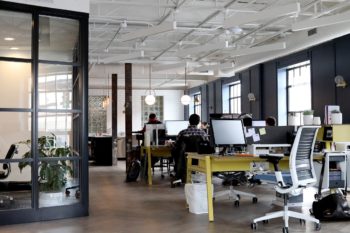
My first job in Manhattan was a thrill! I was working at a small publisher on Long Island for three years and was desperate to get into the Big City and experience the Big Time.
When I joined the agency they were apologetic that the only office space for me was a non-window office. I didn’t care, because, I had come from an open office environment that drove me nuts and was thrilled to get a private space all of my own.
Within a week, I brought in plants and hung colorful posters. I set out photographs of me and my family and friends. I claimed that space!
And when we moved to Fifth Avenue about 8 months later they gave me a choice office that had windows on two walls (looking out on 43rd Street and Fifth Avenue!) because I was such a good sport with my “drab” office.
Perhaps you’re like me and have experienced different office environments — open office, private office and, yes, those damned cubicles. And perhaps you’d agree that open offices (like above) are NOT good office design. And congratulations! There seems to be much research to explain why that is!
But now as a feng shui expert, my training and experience illustrate why, from a feng shui perspective.
There has been an ongoing debate for decades among office design professionals. There are pros and cons of everything. Most importantly, office design is driven by cost savings. Cost of space and cost of furnishings. Not surprisingly, open office design is the least expensive. So experts, for years, have been trying to convince the lot of us that they are great for collaboration and sparking creativity.
Why are open offices poor feng shui?
In short, open offices contribute to stress. Why? It’s the lack control.
Lack command position
In feng shui, command position is the #1 reason why people are stressed out. Yet, because it is subconscious, we don’t even know about it. When was the last time you were startled by someone? You didn’t see them coming. You are not able to see what lies ahead so you are prone to missing opportunities coming your way.
Too yang
These offices are too yang (too energetic and over-stimulating). They do not provide a necessary balance of yin energy (focus and restoration). The visual and noise distractions contribute to a great inability to focus for any length of time. In fact, research in this article says that it takes nearly a half hour to refocus after a distraction! Imagine that! Now I realize why I was so frustrated in those open office plans. My productivity went down the toilet.
Too little yin
I know this sounds just like the opposite of the above, but the yin I’m referring to is coziness. In open spaces, we don’t have a defined personal space. Oftentimes, we are using the same table as everyone else, therefore lack boundaries. Or if we have a desk, it’s just not large enough for us to “claim.” And often in open space environments they discourage or do not allow personal items. Therefore, we feel alienated, not welcome, not cozy.
No access to nature
Most open offices do not have natural sunlight or window views available. These two components of nature contribute to stress according to much research that has been done.
Good Feng Shui Office Tips
- Sit in command position if you are able to. It will improve your outlook, morale, give you new perspectives, and contribute to a feeling of power and creativity. If you cannot be in command position, be sure to place a mirror so that you can see what’s coming up behind you. I did this in a cubicle when I first started my feng shui training and it made all the difference in the world for a $5.99 purchase!
- Shield from Yang Energy. Reduce distractions. Use headphones or ear buds to decrease the impact of noise. The visual distractions…well, nothing we can do about that in an open office plan. Of course, finding a private space when you most need to focus (some open offices have this option) to close a door to remedy all of the distractions in a typical business day.
- Personalize your space. Create some boundary between you and a co-worker. Even placing an object in those corners to cement your personal area. Bring personal items that inspire you, including objects, artwork, photographs.
- Bring nature in. Incorporate some nature in your space with live plants (a vlog/post on low-maintenance, low-light plants), natural found objects, natural-material items.
Interested in becoming a feng shui practitioner? Learn about enrolling class now!

